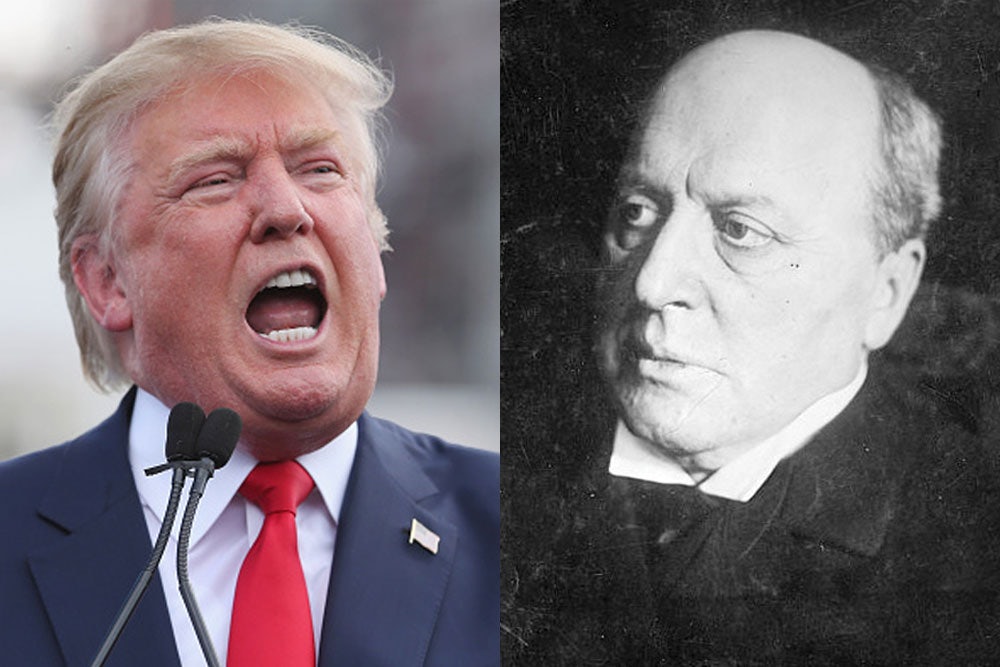Henry James excelled at capturing Americans embarrassing themselves, particularly among foreigners. I’ve been in Brazil since December, and often feel as though the 2016 Republican primary is one long attempt to mortify America in front of the world. (A friend said about a recent Republican debate, with fascination, “It’s even worse than Brazilian politics!”) I turned to James, the ultimate American abroad, as a tonic. While countless writers have attempted to dissect just why so many Americans support Trump, James has proved more persuasive. His stories are full of seductive frauds and egoists. Think of The Portrait of a Lady, in which everyone tries to persuade Isabel Archer that her future husband, Gilbert Osmond, is a fake. “What’s the matter with Mr. Osmond’s type, if it be one?” Archer asks. “His being so independent, so individual, is what I most see in him.” The overlap, at times, is uncanny. So here’s a quiz: Trump critique or Henry James?
- Enter the smart, savvy, scowling showman. He is self-financed and promises restored greatness.
- It is no wonder he wins every game. He has never done a thing in his life except play games.
- His obsession is with “winning,” regardless of the means.
- He is odd and entertaining, vacuous and vain, disarming and terrifyingly dangerous.
- Intelligent, unscrupulous, determined, and capable of seeing a man strangled without changing color.
- [He] poses an almost insuperable challenge to people whose painful duty is to try to extract clarity from his effusions.
- They are the sort of Americans that one does one’s duty by not—not accepting.
- Our relation, all round, exists—it’s a reality, and a very good one; we’re mixed up, so to speak, and it’s too late to change it. We must live IN it and with it.
- Nothing exceeds the license occasionally taken by the imagination of very rigid people.
- Take the word for it of a man who has made his way inch by inch, and does not believe that we’ll wake up to find our work done because we’ve lain all night [dreaming] of it.
- [He] can try to make his blankness a virtue by calling it a kind of innocence.
- Fear, unfortunately, is a very big thing, and there’s a great variety of kinds.
- Everything is relative; one ought to feel one’s relation to things—to others. I don’t think [he] does that.
- There is something I should greatly like—as a moral satisfaction. I should like to hear you say—‘He is abominably selfish!’
- He didn’t care what awful crash might overtake him, with what ignominy or what monstrosity he might yet he associated.
- He’s not of the temperament of the kind of stable, thoughtful person we need as a leader. His imagination must not be married to real power.
- He is alarming as well as absurd, stirring and stoking the worst impulses.
- He is a man who desperately hungers for respect and attention and who, by dint of that very desperation, will likely wind up with neither.
- I think it is established that, in the long run, egotism makes a failure in conduct.
- The shenanigan king is the most selfish politician of them all.
Henry James: 2 (The Golden Bowl), 5 (The American), 7 (Daisy Miller), 8 (The Golden Bowl), 9 (The Europeans), 10 (Roderick Hudson), 12 (What Maisie Knew), 13 (The Portrait of a Lady), 14 (Washington Square), 15 (Beast in the Jungle), 19 (Roderick Hudson)
Trump: 1 (Roger Cohen, The New York Times), 3 (Editorial, National Review), 4 (Charles M. Blow, The New York Times), 6 (George Will, National Reivew), 11 (Editorial, National Review), 16 (Mitt Romney), 17 (Marilynne Robinson, The Guardian), 18 (Jeffrey Kluger, Time), 20 (Danielle Allen, The Washington Post)
